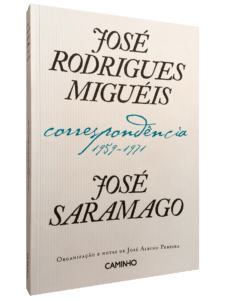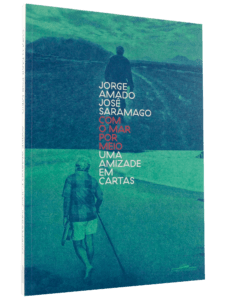In Nomine Dei
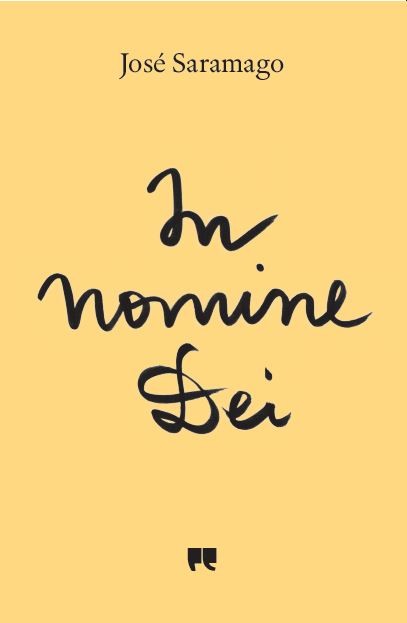
The events described in this piece represent, in a single case, a tragic chapter in the long and apparently irremediable history of human intolerance. Let them read it thus, and so understand it, believers and unbelievers, and they will, perhaps, do themselves a favor. Animals, of course, don't need
Foundation
Awards for the work:
1993. Grand Prize for Theatre from the Portuguese Writers' Association. Portugal.
Portugal
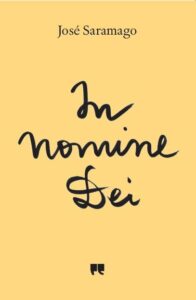
The calligraphy on the cover is by the musician and writer Jorge Vaz de Carvalho
«“Between man, with his reason, and animals, with his instinct, who, after all, will be best equipped for the government of life?” Does not make sense? “If dogs had invented a God, would they fight over differences of opinion as to what to name him, Perdigueiro was, or Lobo-d'Alsace? And if they agreed on the appellation, would they, generation after generation, go around biting each other because of the shape of their ears or the tuft of their canine Deus? “These considerations could be taken as offensive, but José Saramago tries to defend himself: “It is not my fault or my discreet atheism if in Münster, in the 16th century, as in so many other times and places, Catholics and Protestants were slaughtering. to one another in the name of God – “In Nomine Dei” – to come to reach, in eternity, the same Paradise.” “The events described in this piece represent, only, a tragic chapter in the long and, apparently, irremediable history of human intolerance”, explains the author. “Let them read it thus, and so understand it, believers and unbelievers, and they will, perhaps, do themselves a favor. Animals, of course, don't need to.”» (Diário de Notícias, October 9, 1998)
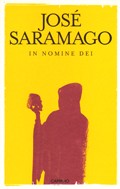
Editorial Path
1993, 5th ed., 2011
Language
Portuguese
«Between man, with his reason, and animals, with their instinct, who, after all, is better equipped to govern life?” Doesn’t that make sense? ”If dogs had invented a God, would they fight over differences of opinion as to what name to give him, whether Pointer or Alsatian Wolfdog? And if they agreed on the name, would they, generation after generation, bite each other over the shape of the ears or the tuft of their canine God?“ These considerations could be taken as offensive, but José Saramago tries to defend himself: “It is not my fault nor that of my discreet atheism if in Münster, in the 16th century, as in so many other times and places, Catholics and Protestants slaughtered each other in the name of God – “In Nomine Dei“ – in order to reach, in eternity, the same Paradise.” ”The events described in this play represent only one tragic chapter in the long and, apparently, irremediable history of human intolerance,“ explains the author. ”Let them read it this way, and understand it this way, believers and non-believers alike, and perhaps they will do themselves a favor. The animals, of course, don’t need it.“ (Diário de Notícias, October 9, 1998)
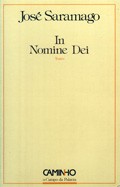
Editorial Path
1993, 5th ed., 2011
Language
Portuguese
«Between man, with his reason, and animals, with their instinct, who, after all, is better equipped to govern life?” Doesn’t that make sense? ”If dogs had invented a God, would they fight over differences of opinion as to what name to give him, whether Pointer or Alsatian Wolfdog? And if they agreed on the name, would they, generation after generation, bite each other over the shape of the ears or the tuft of their canine God?“ These considerations could be taken as offensive, but José Saramago tries to defend himself: “It is not my fault nor that of my discreet atheism if in Münster, in the 16th century, as in so many other times and places, Catholics and Protestants slaughtered each other in the name of God – “In Nomine Dei“ – in order to reach, in eternity, the same Paradise.” ”The events described in this play represent only one tragic chapter in the long and, apparently, irremediable history of human intolerance,“ explains the author. ”Let them read it this way, and understand it this way, believers and non-believers alike, and perhaps they will do themselves a favor. The animals, of course, don’t need it.“ (Diário de Notícias, October 9, 1998)
Brazil
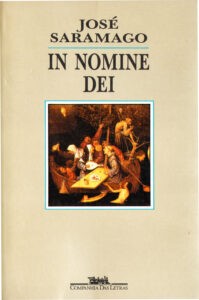
This play recounts the failure of a Protestant rebellion in 16th-century Germany. Initially, there is nobility and a thirst for justice in the characters' actions. But soon the brutality and senselessness of their actions are revealed. Faith victimizes the simplest, credulity tears men apart, hope kills, and egalitarian utopia serves as a pretext for domination. Those who admire the richness of José Saramago's style, his enchanting lucidity, his descriptive violence, might imagine that some of this is lost in a play. The characters' dialogue demands more conciseness; and how can one expect opulent language when the brutal facts and conflicts rush onto the stage? In Nomine Dei, Saramago's play, masterfully answers this question. His readers find here the same great writer of The Gospel According to Jesus Christ: the same strength, the same precision, the same anguish. What changes is the form. We don't have an extreme and delicate narration, but a tragic author who passionately recoils from what he shows.
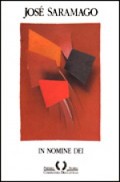
This play recounts the failure of a Protestant rebellion in 16th-century Germany. Initially, there is nobility and a thirst for justice in the characters' actions. But soon the brutality and senselessness of their actions are revealed. Faith victimizes the simplest, credulity tears men apart, hope kills, and egalitarian utopia serves as a pretext for domination. Those who admire the richness of José Saramago's style, his enchanting lucidity, his descriptive violence, might imagine that some of this is lost in a play. The characters' dialogue demands more conciseness; and how can one expect opulent language when the brutal facts and conflicts rush onto the stage? In Nomine Dei, Saramago's play, masterfully answers this question. His readers find here the same great writer of The Gospel According to Jesus Christ: the same strength, the same precision, the same anguish. What changes is the form. We don't have an extreme and delicate narration, but a tragic author who passionately recoils from what he shows.
Spain
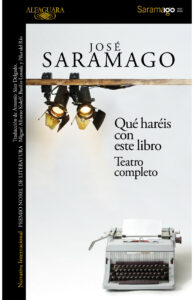
Alfaguara / Penguin Random House
2022 (Translated by Basilio Losada)
(in one volume) Qué haréis con este libro which includes the complete plays of José Saramago)
Special Edition Commemorating the Centenary of José Saramago's Birth
Language
Spanish
«The memory is the playwright that we all have inside. The distance between what was a person and what he remembers is literature.».
Foundation
Saramago called himself «the involuntary playwright», because he always felt that his contribution to the theatrical genre was marked by unlucky circumstances. But, even so, his creative genius gave light to the five works that come together in this volume: La noche (1979), What is there with this book? (1980), The Second Life of Francisco de Asís (1987), In Nomine Dei (1993) and Don Giovanni o El Dissoluto Absuelto (2005).
With the proper honesty of all his work —although coated with an apparent simplicity—, the author's irony and the acuteness of his reflections shine in these masterful pieces. The great heroes now pass to the elderly men and women who, from the honesty and firmness of their convictions, fight for freedom, justice and a better future.
Set in different times and places that go from the Portugal of the triumph of the Revolution of the Claveles or the renaissance of the poet Camões to the Germany of the Lutheran reform, the Italy of Don Giovanni or the displaced timelessness of a growing company, among them the great questions that characterize the thinking of the Portuguese Nobel Prize are not expressed judgments or sentences. It is part of a dialogue that Saramago maintained forever, from each of the pages he wrote, with his readers.
The critic said:
«Saramago vuelve comprehensible a human reality, with parables supported by imagination, compassion and irony».
Nobel Committee
«A man with a sensitivity and a capacity to see and understand that is very much above what we generally see and understand in mortal communities».
Hector Abad Faciolince
«Saramago is an example, a dignified style of life and literature, which demonstrates the possibility of sailing against the current […]. Your word has the value of an antifreeze, of a personal remedy against the gales of cynicism that envelop us».
Luis Garcia Montero
«I don't know, I don't know, from where Saramago got this diabolical narrative tone, hard and funny at a time, [...] that allows him to tell so much about the heart and sometimes so about the story».
Luis Landero
«Saramago writes novels about myths to demystify them, [...] always to address the reality that surrounds him, to deal with current problems that affect everyone, and so that everything is clear from the beginning».
Rafael Conte, Babelia
«Like Günter Grass or Cees Nooteboom, Saramago aspires to engage with an audience that goes beyond national limits».
The Country
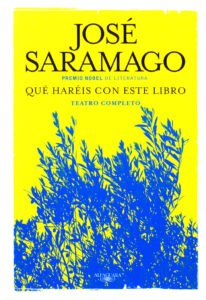
Alfaguara / Penguin Random House
2016 (Translated by Basilio Losada)
(in a volume Qué haréis con este libro that includes the complete dramaturgy by José Saramago)
Language
Spanish
«The memory is the playwright that we all have inside. Put on stage and invent a costume for each being linked to others. The distance between what was a person and what he remembers is literature.»bJosé Saramago
José Saramago called himself «the involuntary playwright» because he always felt that his contribution to this genre was marked by unlucky circumstances. But even so, his creative genius gave light to the five theatrical works that come together now in this volume: La noche (1979), What is there with this book? (1980), The Second Life of Francisco de Asís (1987), In Nomine Dei (1993) and Don Giovanni o El Dissoluto Absuelto (2005). Except for La noche and In Nomine Dei, they were published for the first time in Spain.
With the proper honesty of all his work -although coated with an apparent simplicity-, the author's irony and the acuteness of his reflections shine through in these masterful pieces. The great heroes now pass to the elderly men and women who, from the honesty and firmness of their convictions, fight for freedom, justice and a better future.
Set in different places and times ranging from the Portugal of the triumph of the Claveles revolution or the renaissance of the poet Camões, to the Germany of the Lutheran reform, to the Italy of Don Giovanni or the displaced timelessness of a growing company, among them the great questions that characterize the author's thinking are exposed without prejudice no sentences. All of them are part of a dialogue that Saramago maintained forever, from each of the pages he wrote, with his readers.
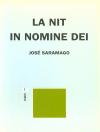
3i4
1995
(In a volume with The Night)
Language
Catalan
3i4
1995
(In a volume with The Night)
Cuba
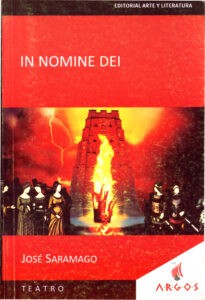
Art and Literature Publishing
2015 (Trans.: Alpízar Castillo)
Italy
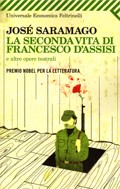
2011 (Trans.: Rita Desti and Giulia Lanciani)
Included in the work La seconda vita di Francesco D'Assisi and other theatrical opere
Language
Italian
José Saramago's theatrical production is animated by its intertwining of poetry, lucidity and power that has an incontrovertible response to his narrator's profession. Il gioco continua di due piani temporali, quello della Storia e quello dell'Invenzione, creat un'infrastruttura que permette ai personaggi di spaziare agilmente di secolo in secolo, di countryie in countrye. And so much fun in the ambient stories that Saramago explores with this quattro pieces. The note follows a writing of the giornale messa in subbuglio, in Portogallo from 1974, from that Rivoluzione dei Garofani that was central in her vita stessa dell'autore. What will I do about this book? I'll make an all-indie leap into four sections for the first time in Portogallo del Cinquecento and follow the journey of Luís Vaz de Camões, the greatest Portuguese poet, in an attempt to give all the stamp to his capolavoro I Lusiadi. The second life of Francesco d'Assisi becomes the great saint I lived in (and in the contemporary world) by showing all his prese with a gross incomprehension with the ordine of Lui Fondato. In Nomine Dei sees anchoring the religion as the main protagonist in the Münster of the XVI century, dove protestanti e cattolici lavano in the blood of the auto da fé le loro divergenze dottrinali.
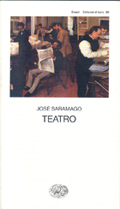
Einaudi
1996 (Trans.: Rita Desti and Giulia Lanciani)
Included in the work Theatre
Language
Italian
«When, between 1977 and 1978, the director of a theater in Lisbon thought about writing an opera in which he was involved in the production of a stage show, he came to see a person without knowing how to practice the technique of theatrical writing, but only one spettatore come tanti altri, lungi dall'immaginare che un giorno avrebbe calcato quel pavement di tavole che, sotto un cielo di corde, macchinari e teloni sospesi, riproduce il mondo’.
All the narrative and poetic writing that is the famous reso, Saramago affianca that drama, in which the creative process is rich in the beginning that supports the rest of his production, deeply intersecting between historical time and inventive time. In La note – di forte autobiografico – la ben note “Rivoluzione dei Garofani”, which in 1974 mise fine alla dittatura in Portogallo, fa da sfondo agli sconvolgimenti, politici e morali, che avvengono nel microcosmo della redazione di un giornale. In Cosa ne farò di questo libro? the scene itself was sposed, always in Portogallo, in the Cinquecento, at the time of Luis Vaz de Camoes, in the Lusitanian period for eccellenza, all prese with the “editorial” difficile to give all the stamp in his capolavoro: I Lusiadi. Anchors the incomprehension, the difficulty of communication, sleeps and motivates him all the time when he encounters the “poverello”, which makes the earth ai giorni nostri, with the Ordine da lui un tempo fondato in La seconda vita di Francesco d'Assisi. And, in fine, In Nomine I gave a response to the incomprehension that farà sfociare in massacri e auto da fé la lotta tra protestanti e cattolici a Munster nel XVI secolo.


